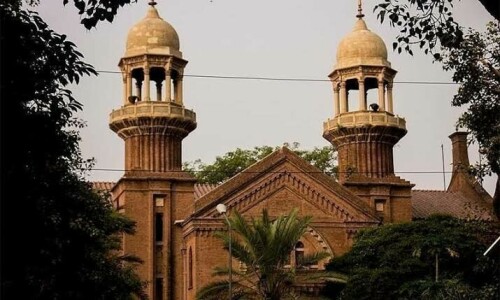CHRONICLES of carnage rarely differ; their time, date, season mere variables. But with each, we are more permanently damaged. There are survivors, tales of lives extinguished and debris of the living. On repeat.
Nevertheless, we are the story people forever at thresholds with presumptions all our own. However, this once, another world waited beyond the majestic iron gates of Al Azhar Garden — towering, immaculate structures in sand hues stood resolute as leafy avenues wove their way through the 4,500-sq-yard complex and young residents evaded a merciless summer sun on marble benches beneath canopies of trees. The place morphed into a powerful metaphor for the exemplary dignity and steadfastness of our deeply wounded Ismaili community.
Also read: Karachi bus attack: Ismaili community bids final farewell to 43 loved ones
At the same time, 45 of the 1,000 homes here harbour devastation — parents who watched venomous bullets perforate their brood; girls orphaned in a heartbeat; an old, handicapped lady left alone in a once buzzing apartment, another middle-aged lady who recovered from her own bullet wounds to subsist on memories of a family lost, in a state of incoherence and deadening depression. And this is the surface of despair.
“We are still in shock. It is hard to believe that we have lost so many innocent lives. Our families are grieving and we are trying to bring life to normality. On behalf of the affected families, I would like to thank all communities, institutions, and individuals for their condolence messages. We are overwhelmed by their kind words,” says Mr Saeed, an entrepreneur who spoke on behalf of the bereaved.
Easily an architectural feat with airy, bright apartments, duplexes and townhouses merging seamlessly, every building opens into a marble atrium built around a hedge in the centre under the open sky. There isn’t a trace of an exposed wire or murky waterways as internet, electricity, television, and the sewerage systems are concealed; even air conditioners are encased in balcony-like concrete cases that fuse into facades. Two leviathan water tanks in a somewhat art deco design — hollow rectangles — work in the gravity supply technique.
Dotted with parks and small, lush gardens, there are 22 signboards in English, Urdu and Gujarati bearing names of Indian villages that were pre-Partition hometowns of the community’s ancestors.
A young boy informs us that many families here migrated from Sidhpur in India to set up house in this extraordinary compound.
In this idyllic space, life is not at rest. There are frenetic, relentless stabs at laying a path to recovery.
“After the funerals, we all returned to work as we will always put our country first. I am a primary schoolteacher at a local institution so at this stage, my aim is to engage scarred children through physical and mental activities. We are employing art and talk therapy with collage work, finger painting and other additions,” says a young Nasreen as she struggles to hold on to composure.
Silah, a nurse at a government hospital, also upholds Nasreen’s view of maintaining a constructive role in Pakistan’s wellbeing. “My colleagues have been unbelievably supportive and helped me return to routine. We are all geared to eliminate fear through healing and catharsis. There are group therapy sessions as well as personal therapy visits. Special group activities for all children have been arranged at our community centres here as every child is affected by the tragedy,” she explains.
Both Nasreen and Silah speak of their neighbours and friends who work at the nearby Memon Hospital with great concern.
“They are severely depressed as they dealt with it first-hand but presently, there is no time to tend to personal sores. We all return from work and immerse ourselves in rehabilitation mechanisms including pursuits for senior citizens such as movies, chess and card games, picnics, sports or just a chat.”
Where an intense sense of bereavement abides, true consolation and willpower emanates from their magnanimous leadership:
“We are shocked and deeply saddened by the attack on the Ismaili community … We would like to express our gratitude to the government, the Pakistan Army, political leaders, civil society and the media for their condolences.
“As stated by His Highness the Aga Khan … Ismailis are a peaceful global community living in harmony with other religious and ethnic groups across the Muslim world. We acknowledge the assurance given by authorities to ensure the safety … of the Shia Imami Ismaili Muslims in Pakistan,” stated Iqbal Walji, President of the Aga Khan Council for Pakistan.
No matter how passive and industrious a community may be, it is more than apparent that the blowback of decades of misdemeanours and injustice threatens to flatten diversity. The carpet under our feet is now shot full of holes.
The mist of memory may never settle in these quarters, but the forever of the future is their ventilator.
As they suffer with unwavering stoicism and reason, I walk out of the gates of the admirable limen people.
Published in Dawn, May 29th, 2015
On a mobile phone? Get the Dawn Mobile App: Apple Store | Google Play













































